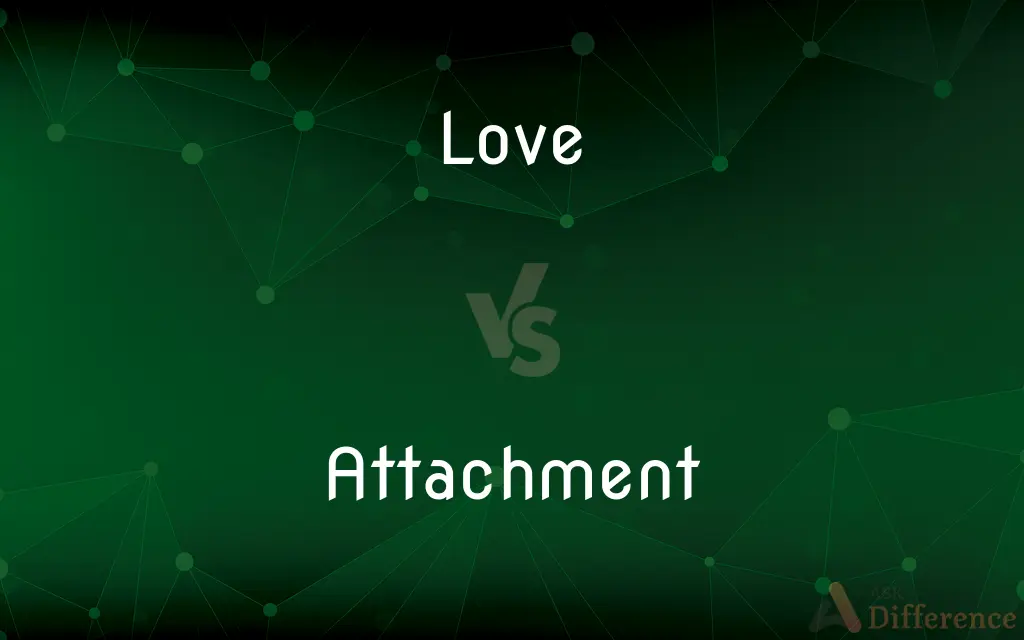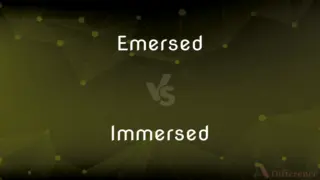Love vs. Attachment — What's the Difference?
By Fiza Rafique & Maham Liaqat — Updated on April 23, 2024
Love is a deep, emotional connection promoting mutual growth, while attachment is often a dependency that may fear loss.

Difference Between Love and Attachment
Table of Contents
ADVERTISEMENT
Key Differences
Love is characterized by a profound affection and selflessness, where the well-being and happiness of the other person are paramount. In contrast, attachment tends to be more about the fulfillment of one's own needs and desires, potentially leading to possessiveness.
Love generally encourages freedom and the individual growth of each person. It supports one’s aspirations without conditions. On the other hand, attachment often fears changes that threaten the status quo, sometimes stifling personal development in favor of maintaining the relationship.
While love can be enduring, adapting to life’s challenges and evolving over time, attachment may struggle under change or stress, showing fragility when circumstances alter the dynamic of the relationship.
Love typically includes accepting someone fully, including their flaws, without a persistent desire to change them. Conversely, attachment may involve a continual need for assurance from the other person, often requiring them to behave in certain ways to appease insecurities.
In love, each partner often feels a robust sense of security and trust, grounded in mutual respect and understanding. However, attachment can breed jealousy and anxiety, stemming from the fear of losing the relationship or the other person’s affection.
ADVERTISEMENT
Comparison Chart
Basis
Deep emotional connection
Dependency on another person
Promotes
Mutual growth and freedom
Possessiveness and dependency
Emotional Stability
Resilient and adaptable
Often fragile under stress
Acceptance of Flaws
Accepts and embraces flaws
May seek to change the other
Response to Change
Adapts and evolves
Struggles and may resist change
Compare with Definitions
Love
An intense feeling of deep affection that is often unconditional.
They shared a love that endured all hardships.
Attachment
A strong emotional bond or tie to someone.
The child’s attachment to her blanket was comforting.
Love
A great interest and pleasure in something.
His love for painting began in his childhood.
Attachment
The act of attaching or the state of being attached.
Her attachment to the project made her work long hours.
Love
An affectionate greeting or expression.
“Lots of love, Julia” she concluded her letter.
Attachment
Dependency on another person for emotional support.
His attachment to his mentor bordered on dependency.
Love
Love encompasses a range of strong and positive emotional and mental states, from the most sublime virtue or good habit, the deepest interpersonal affection, to the simplest pleasure. An example of this range of meanings is that the love of a mother differs from the love of a spouse, which differs from the love of food.
Attachment
An extra part or extension that is or can be attached to something.
The vacuum cleaner came with several attachments.
Love
A strong feeling of affection and concern toward another person, as that arising from kinship or close friendship.
Attachment
Legal seizure of property to force compliance or payment.
The court ordered an attachment of his assets.
Love
A feeling of devotion or adoration toward God or a god.
Attachment
The act of attaching or the condition of being attached.
Love
A feeling of kindness or concern by God or a god toward humans.
Attachment
Something, such as a tie, band, or fastener, that attaches one thing to another.
Love
Often Love(Christianity) Charity.
Attachment
An emotional bond, as of affection or loyalty; fond regard.
Love
An instance of being in love
Teenage loves can be as fleeting as they are intense.
Attachment
A supplementary part; an accessory
Bought a vacuum cleaner with several attachments.
Love
A person for whom one has strong feelings of affection
She met her new love at the restaurant.
Attachment
A supplementary document that is attached to a primary document
Stapled two attachments to the memorandum.
Love
Used as a term of endearment for such a person.
Attachment
A file that is attached to an email.
Love
An intense emotional attachment to something, as to a pet or treasured object.
Attachment
Legal seizure of property.
Love
An expression of one's affection
Send him my love.
Attachment
The writ ordering such a seizure.
Love
A strong predilection or enthusiasm
A love of language.
Love for the game of golf.
Attachment
The act or process of (physically or figuratively) attaching.
Love
The object of such an enthusiasm
The outdoors is her greatest love.
Attachment
A strong bonding with or fondness for someone or something.
I have such an attachment towards my fiancé!
Love
Love(Mythology) Eros or Cupid.
Attachment
A dependence, especially a strong one.
Love
(Sports) A score of zero, as in tennis.
Attachment
A device attached to a piece of equipment or a tool.
Love
To feel love for (a person)
We love our parents. I love my friends.
Attachment
The means by which something is physically attached.
Love
To feel devotion to (God or a god).
Attachment
(computing) A file sent along with a message, usually an email.
Love
To feel or show kindness or concern to (a person). Used of God or a god.
Attachment
(legal) Taking a person's property to satisfy a court-ordered debt.
Attachment of earnings
Love
To have an intense emotional attachment to
Loves his house.
Attachment
(meteorology) The act or process by which any (downward) leader connects to any available (upward) streamer in a lightning flash.
Love
To embrace or caress
They were loving each other on the sofa.
Attachment
The act attaching, or state of being attached; close adherence or affection; fidelity; regard; an passion of affection that binds a person; as, an attachment to a friend, or to a party.
Love
To like or desire enthusiastically
Loves swimming.
Attachment
That by which one thing is attached to another; connection; as, to cut the attachments of a muscle.
The human mind . . . has exhausted its forces in the endeavor to rend the supernatural from its attachment to this history.
Love
To thrive on; need
The cactus loves hot, dry air.
Attachment
Something attached; some adjunct attached to an instrument, machine, or other object; as, a sewing machine attachment (i. e., a device attached to a sewing machine to enable it to do special work, as tucking, etc.).
Love
(uncountable) A deep caring for the existence of another.
Attachment
A seizure or taking into custody by virtue of a legal process.
Love
(uncountable) Strong affection.
Attachment
A feeling of affection for a person or an institution
Love
A profound and caring affection towards someone.
A mother’s love is not easily shaken.
My husband’s love is the most important thing in my life.
Attachment
A supplementary part or accessory
Love
Affectionate, benevolent concern or care for other people or beings, and for their well-being.
Attachment
A writ authorizing the seizure of property that may be needed for the payment of a judgment in a judicial proceeding
Love
A feeling of intense attraction towards someone.
I have never been in love as much as I have with you.
Attachment
A connection that fastens things together
Love
A deep or abiding liking for something; an enthusiasm for something.
My love of cricket knows no bounds.
Attachment
Faithful support for a religion or cause or political party
Love
(countable) A person who is the object of romantic feelings; a darling, a sweetheart, a beloved.
Attachment
The act of attaching or affixing something
Love
A term of friendly address, regardless of feelings.
Hello love, how can I help you?
Attachment
The act of fastening things together
Love
A thing, activity, etc. which is the object of one's deep liking or enthusiasm.
Love
An instance or episode of being in love; a love affair.
Love
Used as the closing, before the signature, of a letter, especially between good friends or family members, or by the young.
Love
(obsolete) A thin silk material.
Love
A climbing plant, Clematis vitalba.
Love
Zero, no score.
So that’s fifteen-love to Kournikova.
Love
Nothing; no recompense.
Love
To have a strong affection for (someone or something).
I love my spouse.
I love you!
I love that song!
Love
(transitive) To need, thrive on.
Mold loves moist, dark places.
Love
(transitive) To be strongly inclined towards something; an emphatic form of like.
I love walking barefoot on wet grass;
I'd love to join the team;
I love what you've done with your hair
Love
To care deeply about, to be dedicated to (someone or something).
Love
(transitive) To derive delight from a fact or situation.
I love the fact that the coffee shop now offers fat-free chai latte.
Love
A feeling of strong attachment induced by that which delights or commands admiration; preëminent kindness or devotion to another; affection; tenderness; as, the love of brothers and sisters.
Of all the dearest bonds we proveThou countest sons' and mothers' loveMost sacred, most Thine own.
Love
Courtship; - chiefly in the phrase to make love, i. e., to court, to woo, to solicit union in marriage.
Demetrius . . . Made love to Nedar's daughter, Helena,And won her soul.
Love
Affection; kind feeling; friendship; strong liking or desire; fondness; good will; - opposed to hate; often with of and an object.
Love, and health to all.
Smit with the love of sacred song.
The love of science faintly warmed his breast.
Love
Due gratitude and reverence to God.
Keep yourselves in the love of God.
Love
The object of affection; - often employed in endearing address; as, he held his love in his arms; his greatest love was reading.
Open the temple gates unto my love.
Love
Cupid, the god of love; sometimes, Venus.
Such was his form as painters, when they showTheir utmost art, on naked Lores bestow.
Therefore do nimble-pinioned doves draw Love.
Love
A thin silk stuff.
Love
A climbing species of Clematis (Clematis Vitalba).
Love
Nothing; no points scored on one side; - used in counting score at tennis, etc.
He won the match by three sets to love.
Love
To have a feeling of love for; to regard with affection or good will; as, to love one's children and friends; to love one's country; to love one's God.
Thou shalt love the Lord thy God with all thy heart, and with all thy soul, and with all thy mind.
Thou shalt love thy neighbor as thy self.
Love
To take delight or pleasure in; to have a strong liking or desire for, or interest in; to be pleased with; to like; as, to love books; to love adventures.
Wit, eloquence, and poetry.Arts which I loved.
Love
To have the feeling of love; to be in love.
Love
A strong positive emotion of regard and affection;
His love for his work
Children need a lot of love
Love
Any object of warm affection or devotion;
The theater was her first love
He has a passion for cock fighting
Love
A beloved person; used as terms of endearment
Love
A score of zero in tennis or squash;
It was 40 love
Love
Have a great affection or liking for;
I love French food
She loves her boss and works hard for him
Love
Get pleasure from;
I love cooking
Love
Be enamored or in love with;
She loves her husband deeply
Common Curiosities
Can attachment be a part of love?
Yes, attachment can be a component of love, but it becomes problematic when it overrides mutual respect and individual growth.
What emotional issues can attachment lead to?
Attachment can lead to issues like jealousy, anxiety, and possessiveness, stemming from insecurity and fear of loss.
How do love and attachment respond to personal growth?
Love supports and encourages personal growth, whereas attachment may resist change that threatens the relationship.
What is the main emotional foundation of love?
The main foundation of love is a deep, emotional connection that supports mutual growth and happiness.
How does attachment affect communication in a relationship?
Attachment can lead to communication that is centered around neediness and reassurance seeking, whereas love promotes open and honest communication focused on mutual understanding.
How can one differentiate between love and attachment in a relationship?
Love is marked by freedom, trust, and the acceptance of the other's individuality, whereas attachment often manifests as possessiveness and a fear of losing the relationship.
What role does self-esteem play in love versus attachment?
Higher self-esteem supports healthy love, which includes respect and trust, while lower self-esteem may lead to insecure attachments.
Does the presence of attachment mean there is no love?
Not necessarily; attachment often exists alongside love, but problems arise when attachment overshadows the healthy aspects of love, leading to dependency and control.
How does attachment differ from love in terms of dependency?
Attachment involves a dependency that often fears loss and focuses on self-needs, unlike the selfless nature of love.
Is it possible for love to exist without any form of attachment?
While some form of emotional attachment is often part of love, ideally, love transcends basic attachment through a deeper connection that includes respect for each other’s autonomy.
Can attachment be transformed into healthier love?
Yes, with awareness and effort, one can work on transforming insecure attachments into healthier, loving relationships by fostering independence, trust, and respect.
What are the signs that one is experiencing love and not just attachment?
Signs of love include wanting the best for the other person without needing something in return, feeling secure, and respecting the other’s independence; attachment often feels anxious and possessive.
How do love and attachment handle conflicts differently?
Love approaches conflicts with a mindset of resolution and understanding, aiming for mutual satisfaction, whereas attachment might handle conflicts with anxiety, leading to clingy or defensive behaviors.
How do cultural perceptions of love and attachment vary?
Cultural norms and values can shape how love and attachment are perceived and expressed; some cultures might emphasize romantic love while others might stress pragmatic attachments.
How does one maintain love in a long-term relationship without falling into negative patterns of attachment?
Maintaining love in a long-term relationship involves continuous communication, fostering mutual growth, respecting personal space, and keeping intimacy alive without becoming overly dependent or possessive.
Share Your Discovery

Previous Comparison
Emersed vs. Immersed
Next Comparison
Glitter vs. ShineAuthor Spotlight
Written by
Fiza RafiqueFiza Rafique is a skilled content writer at AskDifference.com, where she meticulously refines and enhances written pieces. Drawing from her vast editorial expertise, Fiza ensures clarity, accuracy, and precision in every article. Passionate about language, she continually seeks to elevate the quality of content for readers worldwide.
Co-written by
Maham Liaqat















































